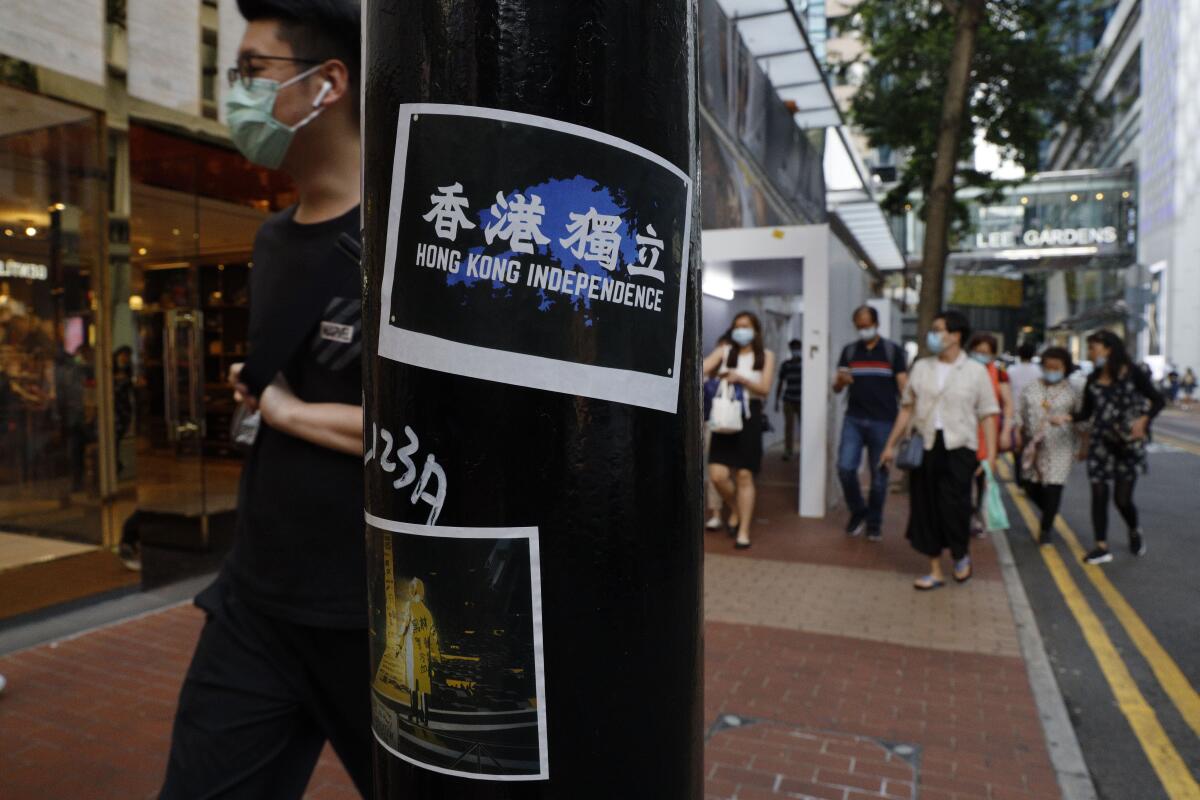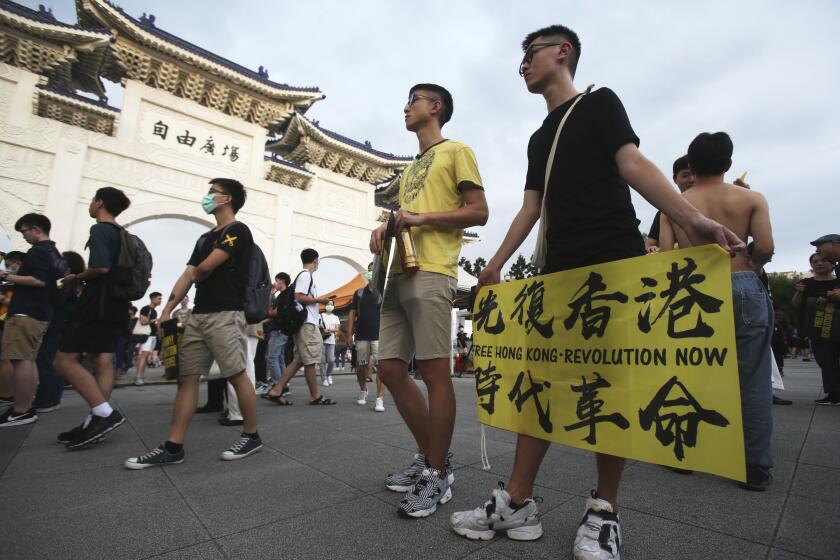Pro-democracy candidates barred from Hong Kong elections, activists arrested under national security law

- Share via
SINGAPORE — Hong Kong authorities have expanded their use of a contentious national security law to disqualify a dozen pro-democracy candidates from running in the territory’s upcoming legislative elections and to arrest four pro-independence activists for “inciting secession” on social media.
The two moves, which took place in a span of 24 hours starting Wednesday, give substance to fears that the new law, imposed by the communist government in Beijing, is being deployed to silence organized dissent in a region that was supposed to be guaranteed a high degree of autonomy from China.
The 12 candidates, who included sitting legislators and high-profile opposition leaders such as Joshua Wong, said they were disqualified for opposing the national security law, which gives mainland China sweeping powers in Hong Kong.
Opposition groups fear the disqualifications are one of several ways through which the government will tilt the September polls in Beijing’s favor. There are also fears the government will postpone the elections, ostensibly because of another outbreak of COVID-19 in the territory.
“Beijing shows a total disregard for the will of ... Hong Kongers, tramples upon the city’s last pillar of vanishing autonomy and attempts to keep Hong Kong’s legislature under its firm grip,” Wong said in a Facebook post Thursday, which included a copy of his disqualification notice.
The national security law also was invoked a day earlier when a special police unit established to enforce the legislation arrested four students in the first planned operation of its kind targeting government critics. Previous arrests under the law were on-the-spot detentions of protesters carrying pro-independence flags and banners with revolutionary slogans.
Police did not identify the three men and one woman arrested, who ranged in age from 16 to 21, but a recently disbanded pro-independence group, Studentlocalism, said the four were former members of the group and included its leader, Tony Chung.
A police spokesman said the suspects, who were all denied bail, were arrested for promoting Hong Kong’s secession from China and pledging to use “all the means” to unite other independence groups.
Less than two weeks under a new national security law enacted by Beijing, Hong Kong residents already feel a curtain of control falling over the city’s realms of speech and thought.
The four face up to life in prison for violating the law, which was introduced July 1 in response to more than a year of pro-democracy protests that have rocked the Asian financial center and driven a deeper wedge between Beijing and Washington. The U.S. has issued sanctions and revoked trade privileges with Hong Kong in response to the law, which China says is designed to target acts of secession, subversion, terrorism and collusion with foreign forces.
Hong Kong was supposed to be granted a high degree of autonomy for 50 years after Britain returned the former colony to China in 1997 under a special arrangement known as “one country, two systems.” The agreement guaranteed Hong Kongers independent courts, a free press and the right to assembly — freedoms that aren’t found across the border in the mainland.
Those differences have made Hong Kongers fiercely proud of their identity and are one of the chief reasons why younger residents harbor no affinity with China.
With the firewall between Hong Kong and the mainland now breached, the city’s status as a global hub buttressed by the rule of law is also eroding. Britain, Canada, Australia and New Zealand have suspended their extradition treaties with the territory. American internet giants Facebook, Google and Twitter have declined to process requests for data by local law enforcement. And senior Hong Kong government officials say foreign banks are shuttering their accounts overseas under U.S. pressure.
Worried residents in the city of 7 million people have deleted social media accounts and emigrated overseas, controversial books have been taken off library shelves and at least one well-known professor, Benny Tai at the University of Hong Kong, has been fired for his support of the democracy movement.
On Thursday, Honcques Laus, a pro-independence activist and former member of Studentlocalism, revealed on Facebook that he had moved to Britain and applied for asylum. He joins Nathan Law, who co-founded the now-defunct political party Demosisto with Wong, in having fled to Europe.
8,000-plus Hong Kongers have resettled in Taiwan since early 2019, seeking shelter from political turmoil as China cracks down on their home city.
The September elections are seen as one of the last vestiges of democracy in Hong Kong, though the legislature is stacked heavily with pro-Beijing representatives. Opposition parties were optimistic about their chances after sweeping victories in district council elections in November and an extraordinary turnout this month for primary elections in the face of the draconian national security law.
But on Tuesday, Hong Kong’s beleaguered chief executive, Carrie Lam, huddled with her Cabinet and close advisors to discuss the possibility of postponing the polls. Hong Kong is grappling with a new outbreak of the coronavirus that has been setting new local records for infections. Though not under lockdown, the city has delayed school reopenings, restricted restaurant dining and mandated mask use.
Opposition candidates worry that the government is considering delaying the elections to blunt the momentum of the pro-democracy side.
“This is not the end of the disqualifications,” said Fernando Cheung, a pro-democracy lawmaker. “And it is still likely that the election will be delayed for one year, further undermining the efforts of the opposition camp in its primary election. By completely shunning a legitimate way for people to express their discontent toward the current regime, it forces the people to turn underground or leave the territory.”
More to Read
Sign up for Essential California
The most important California stories and recommendations in your inbox every morning.
You may occasionally receive promotional content from the Los Angeles Times.












